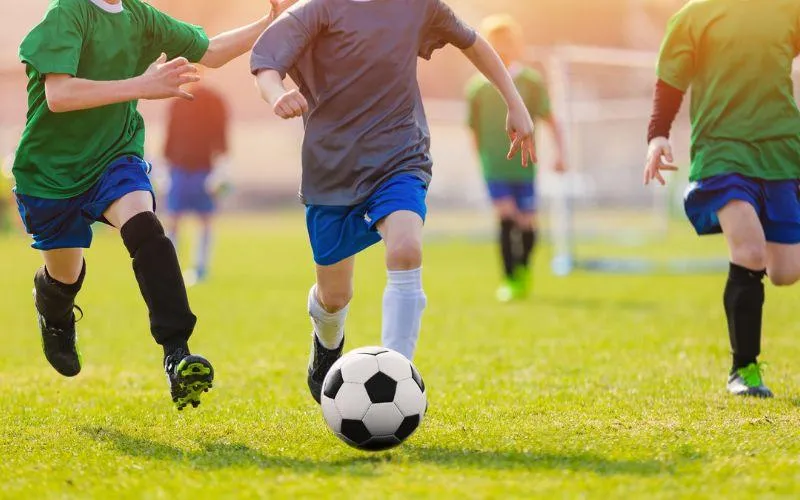

EXERCISE & FITNESS ARTICLES

Supporting Sports Nutrition for Children and Teens
If you are a parent of a young athlete, you are likely familiar with the busy schedule required to balance school, practices, games, and social or family time. Teens with especially high expectations to perform well may find taking time to replenish with food an added burden. Some may even simply forget and skip meals unknowingly.
In addition, athletes often face body weight and size expectations. Activities like wrestling, swimming, dance, and gymnastics are examples of some sports where kids may feel pressure to lose weight. As a parent, you will want to ensure they are not cutting back on their food intake. Inadequate calories, in general, can decrease peak performance and actually break down muscle rather than build it. It can also lead to growth problems and increase the risk of injuries and fractures.
A parent’s role of providing meals and snacks during the day is key to helping children eat enough. While managing this can be tricky, there are some basic things to know to ensure your children are staying well-fueled for all their demanding activities.
Hydration
Hydration is key to maintaining performance, preventing injuries, and aiding in recovery. To determine approximately how much is needed, divide your child’s weight in half. As a baseline, this is how much water in fluid ounces he or she will need each day. Fluid needs will vary depending upon temperature, clothing choice, sweating, humidity, and intensity of exercise. Be sure your child has a water bottle at school and practice. Encourage them to drink water slowly and consistently throughout the day. If they mention feeling thirsty, they are likely already dehydrated.
Perspiration levels can increase fluid needs. Sweat is made of water and minerals such as sodium, potassium, magnesium, and calcium. For the most part, water alone and a healthy diet can replace both the water and minerals lost. Sports drinks are only recommended if exercise exceeds more than one to two hours at a time.
Type of Food and Timing
Energy comes from carbohydrates, fats, and protein. Because carbohydrates are the main source of energy during exercise, it’s important to replenish carbohydrate stores throughout the day. These are the main macronutrients needed consistently. Fats are best consumed in larger amounts after a practice or game. High-fat foods, like fried foods, can cause stomach upset and should be avoided prior to activity. They can fit into a healthy diet but are best tolerated in moderation after an activity is over.
The meal consumed three or four hours before an event should focus on well-balanced and healthy foods. Foods with complex carbohydrates— fruits, vegetables, whole grains, beans, and lentils—are great options to choose from. Lean meats like chicken, turkey, and fish with this meal contain protein that can provide energy and help build and maintain muscle. Healthy fats can come from nuts, olive and avocado oils, and low-fat dairy products. Dairy is also a good source of calcium.
If it’s too late for a full meal but they have one or two hours prior to a practice, snack foods with moderate fiber and carbohydrates are best. You can pack fruit, crackers, bagels, or granola bars.
During practices and games they may want to have snacks available, especially if it has been several hours since they ate and they are feeling low. These can be consumed in smaller amounts either right before and even during practice. Juices, sports drinks, sport gels or gummies, or fruit smoothies can provide the energy needed to get through a tough competition.
After exercise, your child should eat within forty-five minutes in order to replenish the body with the nutrients and support any further muscle growth. Here, you can focus on carbohydrates and protein. Protein is emphasized at this time more than during the performance to aid in building muscle.
Make sure your child understands that calorie needs will vary among their friends based on activity level, body size, and even unpredictable growth spurts. Practice intensity can also vary among athletes on a given team, increasing or decreasing their caloric needs. Encourage your children to listen to their bodies and eat until they are personally feeling satisfied. If they feel hungry, it’s okay to eat more than friends and family. Make sure they are maintaining their weight or are gaining weight and growing as tall as expected. Calorie counting is not recommended and can actually increase stress in their already busy schedules.
Signs of Poor Nutrition
As a parent, you may want to watch for signs that indicate your child is not eating enough calories or getting adequate nutrients in their diet. Some things to watch for are frequent injuries, such as stress fractures or non-healing wounds. For female teens, menstrual irregularities or cessation might indicate the need for increased calories. Inflammation or pain in the joints or frequent muscle cramping can also be signs. Asking a teen if they have ever restricted their diet in any way due to a busy schedule, stress, food fears, or body image concerns can indicate the need for support and monitoring to prevent further decline.
Overall, a general healthy diet focusing on balance and variety can help an athlete meet all their requirements for their sport and for growth.
About the Author Annelies Newman, RDN, CD, received her bachelor’s degree from Brigham Young University with a major in nutrition and dietetics and a minor in music. She is a speaker and presenter on nutrition related topics. Currently, she owns a private practice guiding individuals to make changes for better health and wellness. On the side, she enjoys adventuring with her husband and three little boys outdoors. She believes that real food is good for the body and should be enjoyed!
